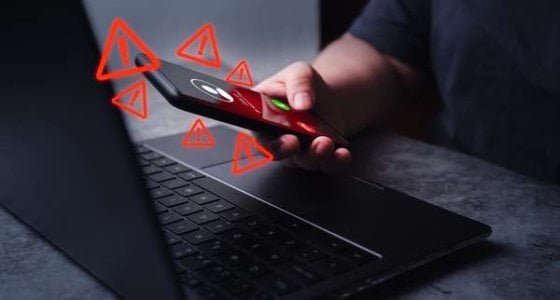Ex-police officer falls victim to impersonation scam: Police advise what to watch out for!
- Replies 30
In an age where we're constantly reminded to strengthen our passwords and keep our personal information secure, it's alarming to hear that even the most vigilant can fall prey to sophisticated scams.
Recently, an alarming new twist on bank fraud saw scammers exploiting vulnerabilities in security protocols to deceive victims.
As the methods used by fraudsters evolve, it becomes increasingly crucial for individuals to stay informed and vigilant against such deceptive schemes.
Danielle Maddock, an ex-police officer with a decade of experience, was caught off guard by such a scam.
Despite her law enforcement background and her awareness of common scam indicators, she found herself ensnared by a scammer posing as a representative from her bank.
The scammer's call came at a time when Maddock was preoccupied with her newborn and home renovations, illustrating how scammers exploit moments of distraction and stress to their advantage.

The scammer's approach was disarmingly professional, using an Australian accent and possessing enough personal information, including the last four digits of Maddock's debit card, to appear legitimate.
The absence of telltale signs of a scam, such as a delay before speaking, further lowered Maddock's guard.
‘It sounded so normal,’ Ms Maddock recalled.
He informed her that multiple transactions were being made with her card in Melbourne and inquired if she had authorised them.
When she denied it, he said he would cancel the card and halt the transactions but requested additional personal information to verify her identity as Danielle Maddock.
He also mentioned she would receive a six-digit code on her mobile. After receiving the text, Ms Maddock provided the code to him.
‘Now that I say that, I should have picked that up,’ she lamented.
The man informed her that her new card would be issued within four to five business days, and then they concluded the call.
Only 10 minutes later, she received another call, which was genuinely from her bank.
‘[The woman] said, “Are you making transactions at the moment?”’ Ms Maddock narrated.
‘I said, “No, I'm not. I just had a guy call about the fraudulent transactions, and he's cancelled my card.”’
‘The woman said, “No, that card is very much active. That was actually the scammer,”’ she continued.
The woman assured her that the card would be properly cancelled and recommended that she visit a bank branch as soon as possible.
Thankfully, the bank's prompt intervention prevented the fraudulent transactions from being processed.
‘[I feel] pretty dumb,’ Ms Maddock shared.
‘I'm an ex-cop so I thought I'd be pretty savvy on that stuff.’
‘But it makes me really worried for elderly and vulnerable people—they will fall for that,’ she added.
Jason Veltruski, the Fraud Operations Manager at NGM Group, is credited with the bank's swift response.
Mr Veltruski explained that these scams often involve sharing bits of information about the customer to establish trust, combined with a sense of urgency that discourages them from questioning the scammer.
‘Taking the fraud angle, it makes the customer stand up and listen,’ he said.
‘They think, “OK, I don't want to be a victim of fraud, so I'm going to do whatever you tell me.”’
Detective Superintendent Matt Craft of the NSW Police Cyber Crime Squad pointed out that crucial information plays a significant role in these scams.
Scammers provide just enough information to build trust while gaining access to more sensitive details, such as two-factor authentication codes.
He noted that one of the most frequent methods for scammers to acquire personal information is through data breaches.
‘We're constantly looking on the dark web for lists of personal identification information,’ Superintendent Craft stated.
‘It is sold. It is traded. It's traded as a commodity for cyber criminals.’
‘It's a form of currency for those cyber criminals because they understand the value,’ he added.
Superintendent Craft mentioned several methods for safeguarding yourself.
‘Be wary of unsolicited phone calls from people that you don't know and that you can't identify,’ he advised.
According to him, when you receive calls like this, hang up immediately.
He also cautioned against sharing confidential information with anyone over the phone.
‘Always remember that [most] legitimate businesses will not call you requesting personal information,’ he reminded.
While phone scams exploiting two-factor authentication codes continue to pose a significant risk, another alarming scam highlights the dangers of seemingly innocuous messages.
As we’ve seen with recent fraud cases, scammers are becoming increasingly sophisticated in their tactics.
In one instance, a man almost lost $3 million due to a single fraudulent text message.
Understanding these threats and knowing how to protect yourself is crucial in today’s digital landscape.
 Have you or someone you know been a victim of such schemes? How can you further safeguard yourself from them? Share your experiences and tips with the community in the comments below.
Have you or someone you know been a victim of such schemes? How can you further safeguard yourself from them? Share your experiences and tips with the community in the comments below.
Recently, an alarming new twist on bank fraud saw scammers exploiting vulnerabilities in security protocols to deceive victims.
As the methods used by fraudsters evolve, it becomes increasingly crucial for individuals to stay informed and vigilant against such deceptive schemes.
Danielle Maddock, an ex-police officer with a decade of experience, was caught off guard by such a scam.
Despite her law enforcement background and her awareness of common scam indicators, she found herself ensnared by a scammer posing as a representative from her bank.
The scammer's call came at a time when Maddock was preoccupied with her newborn and home renovations, illustrating how scammers exploit moments of distraction and stress to their advantage.

A former police officer was deceived by a sophisticated bank impersonation scam despite her professional background. Credit: Shutterstock
The scammer's approach was disarmingly professional, using an Australian accent and possessing enough personal information, including the last four digits of Maddock's debit card, to appear legitimate.
The absence of telltale signs of a scam, such as a delay before speaking, further lowered Maddock's guard.
‘It sounded so normal,’ Ms Maddock recalled.
He informed her that multiple transactions were being made with her card in Melbourne and inquired if she had authorised them.
When she denied it, he said he would cancel the card and halt the transactions but requested additional personal information to verify her identity as Danielle Maddock.
He also mentioned she would receive a six-digit code on her mobile. After receiving the text, Ms Maddock provided the code to him.
‘Now that I say that, I should have picked that up,’ she lamented.
The man informed her that her new card would be issued within four to five business days, and then they concluded the call.
Only 10 minutes later, she received another call, which was genuinely from her bank.
‘[The woman] said, “Are you making transactions at the moment?”’ Ms Maddock narrated.
‘I said, “No, I'm not. I just had a guy call about the fraudulent transactions, and he's cancelled my card.”’
‘The woman said, “No, that card is very much active. That was actually the scammer,”’ she continued.
The woman assured her that the card would be properly cancelled and recommended that she visit a bank branch as soon as possible.
Thankfully, the bank's prompt intervention prevented the fraudulent transactions from being processed.
‘[I feel] pretty dumb,’ Ms Maddock shared.
‘I'm an ex-cop so I thought I'd be pretty savvy on that stuff.’
‘But it makes me really worried for elderly and vulnerable people—they will fall for that,’ she added.
Jason Veltruski, the Fraud Operations Manager at NGM Group, is credited with the bank's swift response.
Mr Veltruski explained that these scams often involve sharing bits of information about the customer to establish trust, combined with a sense of urgency that discourages them from questioning the scammer.
‘Taking the fraud angle, it makes the customer stand up and listen,’ he said.
‘They think, “OK, I don't want to be a victim of fraud, so I'm going to do whatever you tell me.”’
Detective Superintendent Matt Craft of the NSW Police Cyber Crime Squad pointed out that crucial information plays a significant role in these scams.
Scammers provide just enough information to build trust while gaining access to more sensitive details, such as two-factor authentication codes.
He noted that one of the most frequent methods for scammers to acquire personal information is through data breaches.
‘We're constantly looking on the dark web for lists of personal identification information,’ Superintendent Craft stated.
‘It is sold. It is traded. It's traded as a commodity for cyber criminals.’
‘It's a form of currency for those cyber criminals because they understand the value,’ he added.
Superintendent Craft mentioned several methods for safeguarding yourself.
‘Be wary of unsolicited phone calls from people that you don't know and that you can't identify,’ he advised.
According to him, when you receive calls like this, hang up immediately.
He also cautioned against sharing confidential information with anyone over the phone.
‘Always remember that [most] legitimate businesses will not call you requesting personal information,’ he reminded.
While phone scams exploiting two-factor authentication codes continue to pose a significant risk, another alarming scam highlights the dangers of seemingly innocuous messages.
As we’ve seen with recent fraud cases, scammers are becoming increasingly sophisticated in their tactics.
In one instance, a man almost lost $3 million due to a single fraudulent text message.
Understanding these threats and knowing how to protect yourself is crucial in today’s digital landscape.
Key Takeaways
- A former police officer was caught off guard by a sophisticated bank impersonation scam even with her professional background.
- The scammer had enough personal information to gain her trust and obtain a two-factor authentication code necessary for making fraudulent transactions.
- The NSW Police Cyber Crime Squad highlighted the importance of being cautious with unsolicited phone calls and guarding personal information, especially with the prevalence of data breaches.
- To prevent falling victim to such scams, people were advised to hang up on unknown callers asking for personal details and never share confidential information over the phone.







